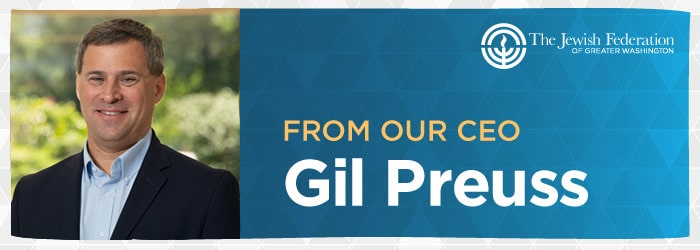-
15 November 2019

This week, I dove into the topic of Jewish engagement while also being highly engaged myself. For three days, I joined hundreds of Jewish professionals for the first-ever FedLab conference, put on by The Jewish Federations of North America (JFNA). Together, we tested our assumptions, discussed new ideas, and pushed each other to think creatively about key issues currently facing the Jewish community.
FedLab was not your typical conference. Rather than plan for the usual list of large-scale sessions, FedLab was designed to be more focused and much more interactive. As the name suggests, JFNA embraced the laboratory theme and encouraged everyone to learn, collaborate, and problem solve.
As participants, we were asked to commit to one of three tracks: Jewish Security & Empowerment; #EngageJewish; and Action for Good in the 21st Century. From there, we were divided into small groups and tasked with driving our particular conversations forward. Indeed, for the conference to work, everyone had to contribute. Within the #EngageJewish track, we wrestled with the ongoing question of how we encourage people to transition from passive consumers into active producers of Jewish content and experiences.
To help further our thinking, we examined several case studies from within and outside the Jewish community. We looked at the evolution of Napster, Uber, Airbnb, Netflix, Wikipedia, and other efforts that helped transform and define their industries. We also heard from Jewish changemakers in the room who are implementing new initiatives and experimenting with new models of Jewish engagement.
What I valued most, however, was being together with a full array of Jewish professionals and volunteer leaders who are working across the sector to strengthen Jewish life. There were representatives from a wide range of organizations, including people from long–running organizations and new organizations, and from those focused on historical populations and on newly engaged community members. As a result of our diverse vantage points, we all learned more, questioned more, and challenged each other more. We also began forming connections and relationships where there may not have been before. This, after all, was the underlying goal of FedLab—to help move the Jewish community from a hub-and-spoke model, with “central” organizations and “peripheral” organizations, into a strong and integrated network.
Of course, the three days we spent together were only a starting point for the next phase of these important conversations, many of which feature prominently in our work at Federation. Moving forward, all of us in the Jewish community must continue to take ownership of these issues and create spaces for open and inclusive dialogue. We must continue to connect one hub to another and play our part in a vibrant and forward-thinking network. Part of our role as a Federation is to help foster the culture and conversations that can best support a networked community.
FedLab called on us to adopt an experimental mindset; one that allowed everyone to think more freely about how we work together as a community to strengthen Jewish life. Now that I have left the lab, it will be incumbent upon all of us to further strengthen this approach to building community. The power and creativity of our community is tremendous. The question now is how we best leverage our talents to help strengthen communal life to the benefit of each and every person.
Shabbat Shalom,
Gil
